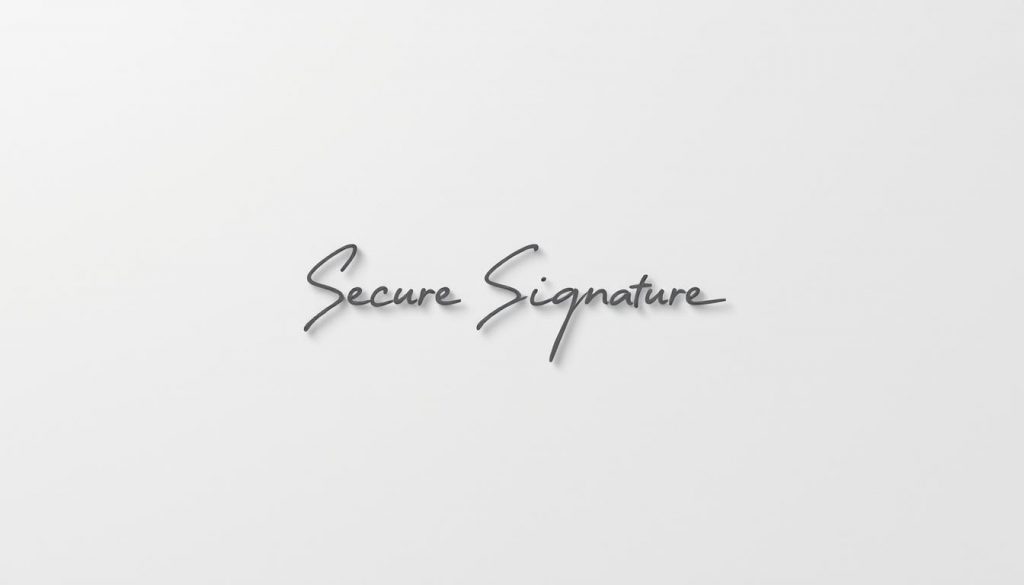Creating a valid digital will is a crucial step in securing your estate and ensuring that your wishes are respected. We strongly recommend that once signed and witnessed, you get all your documents checked to ensure they have been completed correctly.
At Simpler Law, we understand the importance of accurate estate planning. Verifying your digital will signature is a simple yet vital process that provides peace of mind for you and your loved ones.
Key Takeaways
- Verify your digital will signature to ensure it is valid and accurate.
- Secure your estate by completing all documents correctly.
- Accurate estate planning provides peace of mind for you and your loved ones.
- Simple and secure process for verifying digital will signatures.
- Expert guidance available to walk you through the verification process.
Understanding Digital Wills and Their Requirements
With the increasing popularity of digital estate planning, it’s more important than ever to comprehend the intricacies of digital wills. As we delve into the world of electronic will signing and online will authentication, it’s crucial to understand the foundational elements that make a digital will valid and enforceable.
What Constitutes a Digital Will?
A digital will is essentially a legally binding document that outlines how an individual’s assets should be distributed after their passing, all facilitated through digital means. This includes:
- Electronic creation and signing of the document
- Digital storage and management of the will
- Online authentication processes to verify the signatory’s identity
Every completed document is supported by a digital certificate that documents the author, signers, devices used, IP addresses, time, and date stamps. An advanced audit trail records the document transaction at every stage, ensuring a transparent and tamper-evident process.
Legal Framework for Digital Wills in the UK
The legal framework governing digital wills in the UK is evolving, with legislation aiming to accommodate the digital age while ensuring the integrity and authenticity of wills. Key aspects include:
- Compliance with the Electronic Communications Act 2000
- Adherence to the principles outlined in the Wills Act 1837, where applicable
- Use of secure electronic signatures that meet the EU’s eIDAS regulation standards
It’s essential to stay updated with the latest legal requirements to ensure that your digital will is legally binding.
Key Differences Between Digital and Traditional Wills
While the core purpose of a will remains unchanged, digital wills offer several advantages over traditional wills, including:
- Increased accessibility and ease of update
- Enhanced security features, such as encryption and secure authentication
- Reduced risk of loss or damage
However, it’s crucial to understand these differences to make an informed decision about your estate planning needs.
The Importance of Signature Verification
Verifying the signature on a digital will is a crucial step that ensures its legitimacy. In the digital age, the authenticity of documents, especially those as significant as wills, cannot be overstated. Secure digital signatures are at the forefront of this verification process, providing a robust method to confirm the signer’s identity.
Signature verification matters for several reasons. Firstly, it ensures that the digital will is genuine and has not been tampered with. This is where will authentication technology plays a vital role. By using advanced cryptographic techniques, it’s possible to verify that the document was signed by the person it claims to be, thereby safeguarding against fraud.
Why Signature Verification Matters
Signature verification is essential because it prevents potential disputes over the will’s authenticity. Without proper verification, a digital will could be contested, leading to lengthy and costly legal battles. As noted by e-sign.co.uk, “If you were not involved in the signing process and need to verify the validity of the eSignature on a document, particularly when handed a hard copy, follow specific steps to ensure its authenticity.” This underscores the importance of having a clear and verifiable signature process in place.
“The integrity of a digital will is only as strong as its signature verification process.”
Consequences of a Non-Verified Digital Will
The consequences of not verifying a digital will signature can be severe. A non-verified digital will may be deemed invalid, leading to the estate being distributed according to the laws of intestacy rather than the deceased’s wishes. This can have profound implications for the family and loved ones, potentially causing distress and financial hardship.
To avoid such outcomes, it’s crucial to ensure that digital wills are signed and verified using reliable digital signature tools. This not only provides peace of mind but also ensures that the deceased’s estate is handled according to their intentions.
Methods of Digital Signature Verification
To ensure the integrity of digital wills, it’s vital to understand the methods used for digital signature verification. This process is crucial in confirming that a digital will is genuine and has not been tampered with.
Cryptographic Techniques Explained
Cryptographic techniques form the backbone of digital signature verification. These methods use algorithms to create a unique digital fingerprint for the signatory, ensuring that any alterations to the document are detectable. Cryptographic hash functions and public-key cryptography are two key technologies used in this process.
For instance, when a digital will is signed, a cryptographic hash function generates a hash value based on the document’s content. This hash value is then encrypted using the signatory’s private key. To verify the signature, the recipient decrypts the hash value using the signatory’s public key and compares it with a newly generated hash of the received document. If the two hash values match, the signature is valid.

Third-party Verification Services
Third-party verification services provide an additional layer of security and trust in digital signature verification. These services act as independent validators, confirming that the digital signature was created under the control of the signatory. Relying on trusted third-party services can simplify the verification process for executors and beneficiaries.
According to e-sign.co.uk, “You can verify the signature by scanning or clicking the QR Code on the cover page. Check the URL, SSL security, and information in the signature verification box.” This straightforward process underscores the importance of using reputable verification services.
“The use of third-party verification services can significantly reduce the risk of disputes over digital wills by providing an independent confirmation of the signatory’s identity and intent.”
The Role of Blockchain in Signature Verification
Blockchain technology is increasingly being explored for its potential to enhance digital signature verification. By storing digital signatures on a blockchain, it’s possible to create an immutable record that can be verified by multiple parties. This tamper-evident and transparent approach can add significant trust to the digital will verification process.
While blockchain is still an emerging technology in the context of digital wills, its potential to provide a secure and transparent method for verifying digital signatures is considerable. As the technology matures, we can expect to see more innovative applications in the field of estate planning.
Step-by-Step Process for Verifying Digital Will Signatures
Ensuring the authenticity of your digital will begins with verifying the digital signature, a process that we will guide you through step by step. Verifying a digital will signature is crucial for validating the will and ensuring it is legally binding.
Initial Document Review
The first step in verifying a digital will signature involves a thorough review of the digital will document. This includes checking for any alterations or tampering with the document. We compare the digital will document with the original version to ensure they match, much like the HM Passport Office compares a wet signature on a letter or paper application form against the signature held on passport and application records.
During this review, we check for:
- The integrity of the document
- Any signs of tampering or alteration
- Compliance with legal requirements
Checking Digital Signature Validity
After confirming the document’s integrity, the next step is to verify the digital signature. This involves using cryptographic techniques to ensure the signature is genuine and linked to the signatory. We use trusted digital signature verification tools to check the validity of the signature.
The process includes:
- Decrypting the digital signature
- Verifying the signatory’s identity
- Confirming the signature’s compliance with legal standards
| Verification Step | Description | Tools Used |
|---|---|---|
| Document Integrity Check | Ensuring the document has not been tampered with | Digital forensic tools |
| Signature Decryption | Decrypting the digital signature to verify its authenticity | Cryptographic software |
| Signatory Verification | Confirming the identity of the signatory | Identity verification services |
Final Verification and Documentation
The final step involves documenting the verification process and its outcomes. This includes creating a record of the verification steps taken, the tools used, and the results. This documentation is crucial for legal purposes and provides a clear audit trail.
By following these steps, we can ensure that your digital will signature is verified thoroughly and in compliance with legal requirements, providing peace of mind for you and your loved ones.
Common Challenges in Signature Verification
Digital will signature verification poses several challenges, from technical glitches to legal misunderstandings. Ensuring the integrity and authenticity of digital signatures is crucial for the validity of digital wills.
Technical Issues with Digital Signatures
Technical issues can significantly hinder the verification process of digital signatures. We must consider the following:
- Software compatibility issues
- Problems with digital certificate validation
- Encryption and decryption errors
To mitigate these issues, it’s essential to use reliable digital signature tools and ensure that all parties involved in the signing and verification process are aware of the technical requirements.
Legal Complications and Misunderstandings
Legal complications can arise due to misunderstandings about the legal requirements for digital wills and their signatures. For instance, the legal framework surrounding digital wills can be complex, and staying updated with the latest legislation is vital.
We recommend consulting with legal professionals who specialize in digital estate planning to navigate these complexities.
Addressing Concerns around Fraud
Fraud is a significant concern when it comes to digital signatures and wills. To address this, we emphasize the importance of:
- Using secure email access
- Avoiding password reuse
- Protecting secure links
By following these guidelines and using secure digital signatures, we can significantly reduce the risk of fraud.
To further illustrate the challenges and solutions, let’s examine a comparative analysis of common issues and their potential resolutions:
| Challenge | Description | Potential Resolution |
|---|---|---|
| Technical Issues | Software compatibility and encryption problems | Use reliable digital signature tools |
| Legal Complications | Misunderstandings about legal requirements | Consult legal professionals |
| Fraud Concerns | Risk of fraudulent activities | Implement secure practices (e.g., unique passwords, secure links) |

By understanding these challenges and implementing the suggested measures, we can ensure a smoother and more secure digital will signature verification process.
Best Practices for Creating a Secure Digital Will
As we navigate the complexities of digital estate planning, it’s essential to ensure that our digital wills are secure and legally binding. Creating a digital will that meets legal standards and is resistant to potential fraud or disputes requires careful consideration and the right tools.

Reliable Digital Signature Tools
One of the critical components of a secure digital will is the use of reliable digital signature tools. These tools not only provide a secure method of signing but also ensure that the signature is legally binding. We recommend using digital signature tools that are compliant with UK laws and regulations, such as those that utilize advanced cryptographic techniques.
- Choose a digital signature tool that is accredited by a recognized UK authority.
- Ensure that the tool provides a clear audit trail and secure storage for your digital will.
- Use a tool that allows for multiple signatures if required, such as for witnesses.
According to Simpler Law, “once signed and witnessed, it’s crucial to get all your documents checked to ensure they have been completed correctly.” This step is vital in ensuring that your digital will is not only secure but also valid and enforceable.
“The use of digital signatures can significantly reduce the risk of disputes over the authenticity of a will.”
Ensuring Compliance with Legal Standards
Ensuring that your digital will complies with UK legal standards is paramount. This involves understanding the legal requirements for digital wills in the UK, including the need for witnesses and the specific formalities that must be observed.
Key Considerations:
- Understand the legal requirements for creating a digital will in the UK.
- Ensure that your digital will is witnessed in accordance with UK law.
- Keep your digital will up to date and review it regularly to reflect any changes in your circumstances or wishes.
By following these best practices and utilizing reliable digital signature tools, individuals can create a secure digital will that protects their digital assets and ensures their wishes are carried out as intended.
Recommended Services for Digital Will Signature Verification
Choosing a reliable service for digital will signature verification is crucial for ensuring the validity of your digital will. With numerous providers available, it’s essential to understand their offerings and how they can meet your needs.
Overview of Trusted Providers
Several reputable services specialize in digital will signature verification. For instance, DocuPilot offers advanced electronic signature verification solutions. Simpler Law also provides a document validation service, giving clients peace of mind that their documents are completed correctly before submission.
When evaluating these services, consider their:
- Reliability and accuracy in verifying signatures
- Compliance with UK legal standards
- User experience and interface
- Customer support and service
Comparisons of Costs and Features
Different providers offer various pricing models and features. Some may charge per signature verification, while others offer subscription-based services. It’s crucial to compare these costs and features to determine which service best suits your needs.
For example, a detailed comparison might look like this:
| Provider | Cost | Features |
|---|---|---|
| DocuPilot | £10 per verification | Advanced cryptographic techniques, compliance with UK law |
| Simpler Law | £20 per document validation | Comprehensive document review, legal expert support |
As “The right service can make all the difference in ensuring your digital will is secure and legally binding.”
“Using a reliable digital signature verification service provides peace of mind that your digital will is authentic and compliant with legal requirements.”
By carefully evaluating these services and their offerings, you can make an informed decision that best protects your estate and loved ones.
Future Trends in Digital Will Signature Verification
The landscape of digital will signature verification is evolving rapidly, driven by advancements in technology and legislation. As we move forward, it’s essential to understand the emerging trends that will shape the future of digital will verification.
Evolving Legislation and Regulations
Governments and regulatory bodies are continually updating laws to accommodate the digital age. We expect to see more comprehensive legislation around digital wills, including stricter guidelines for signature verification. This will likely involve:
- Standardization of digital signature formats to ensure interoperability across different platforms.
- Enhanced security measures to protect against fraud and unauthorized access.
- Clearer definitions of what constitutes a legally binding digital signature.
Technological Advances on the Horizon
Technology is playing a crucial role in the evolution of digital will signature verification. Some of the key technological advancements include:
- Blockchain technology, which offers a secure and transparent way to store and verify digital signatures.
- Artificial Intelligence (AI) and machine learning algorithms that can help detect potential fraud and verify identities more accurately.
- Biometric authentication methods, such as fingerprint and facial recognition, to add an extra layer of security.
As these trends continue to emerge, we must stay informed and adapt to the changing landscape of digital will signature verification. By doing so, we can ensure that our digital wills remain secure and legally binding.
Conclusion: The Necessity of Effective Signature Verification
Verifying the authenticity of digital wills is crucial in ensuring that the wishes of the deceased are respected. As we’ve discussed, secure digital signatures play a vital role in will document verification, providing a reliable means of confirming the identity of the signatory.
Key Takeaways
The importance of verifying digital will signatures cannot be overstated. It is essential to understand the methods and best practices for digital signature verification to prevent potential disputes or fraud.
Ensuring Digital Will Security
By using reliable digital signature tools and ensuring compliance with legal standards, individuals can create a secure digital will that accurately reflects their intentions. We recommend exploring trusted providers for digital will signature verification to find the best solution for your needs.

